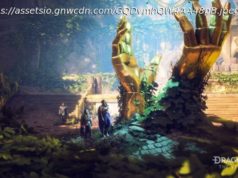Scriptwriter Lara Derham and psychologist Paul Fletcher discuss how the game used other characters to explore horn Senua’s mental health
Ninja Theory’s 2017 game Hellblade: Senua’s Sacrifice is famous for exploring the experiences of people with psychosis through the medium of a vision quest undertaken by Senua, a Celtic warrior in the early Middle Ages. It earned acclaim for its sensitive, thoroughly researched, and audio-visually immersive portrayal of Senua’s condition — something the Ninja Theory team had arrived at through close collaboration with Paul Fletcher, a professor of psychology at the University of Cambridge.
Following a singular success like this is always challenging, but maybe especially so in the case of Senua’s Saga: Hellblade 2, which was released this week on Windows PC and Xbox Series X, and is included with Game Pass. How could Ninja Theory bring players back into Senua’s experience of the world without rehashing the first game — or sidelining or trivializing her condition? How could it raise the stakes for the character without undoing Senua’s growth, or succumbing to the “descent into madness” tropes the first game had so conscientiously avoided?
The answer, as it turns out, was quite simple: Have her meet and interact with other people.
“We definitely didn’t want to walk back on [the first game] and make it seem as though we’re resetting her,” scriptwriter and Performance Capture Director Lara Derham said during a conversation with myself and Fletcher at Ninja Theory’s Cambridge offices, which Polygon visited a couple months before the game’s launch.
“She’s still got that sense of a greater sense of peace, a greater sense of opportunity,” Derham said. “But I see the first game as a very internal journey, very personal, and very oriented around herself and what she’s lost. And I think this game, while we’re still obviously seeing the world through Senua’s eyes, it’s more about interacting with the world around her, people around her, and pushing out into the future a little more.”
This makes sense dramatically, but for Fletcher it was also an opportunity to get deeper into a crucial aspect of psychosis that the first game, by nature, hadn’t really explored.
Домой
United States
USA — software In Hellblade 2, the biggest challenge Senua faces is other people






